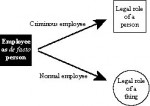In this fifth and concluding part of the review of John Tomasi’s book Free Market Fairness, we look at the invisible hand mechanism of the property system (in contrast to the usual price system) which seems to be invisible to liberal scholars and social scientists since it does not give a satisfactory “account” of the current economic system based on the renting of human beings.
Listen Libertarians! Part IV
In this Part IV, we consider the rather fake “inalienable rights” theory of classical liberal/libertarian thought that is consistent with a civilized voluntary slavery contract, a nondemocratic pact of subjection, and a coverture marriage contract, all of which are outlawed in the advanced democracies.
Listen Libertarians! Part III
In this Part III, we consider the conceptual misunderstanding of what Tomasi calls “productive property” which allows the basic capitalism-versus-socialism misframing of the debate about the so-called “capitalist” system.
Listen Libertarians! Part II
In Part I of this series, we saw how Tomasi used the standard consent-versus-coercion misframing of the basic issues in his new book: Free Market Fairness. In this Part II, we consider the misframing involved in the treatment of property rights.
Listen Libertarians! Part I
This is Part I of a five part review of John Tomasi’s Hayek-Rawls remix in his new book: Free Market Fairness.
Free Cities: What could be wrong with that?
This post is an update of a previous post on The Charter Cities Debate and Democratic Theory. A new twist on Paul Romer’s idea of charter cities has come to my attention. It is promoted under the name of “free cities.” The home base seems to be the Free Cities Institute headquartered at the Francisco Marroquin University, a right-wing university in Guatemala.
Inalienable Rights: Part III A Litmus Test for Liberalism
Surely it is not too much to ask a modern liberal theory of justice that it provide a coherent account of why some contracts, e.g., self-sale contract, should be deemed invalid and why the rights such contracts would legally alienate are inalienable. In that sense, the theory of inalienable rights provides a historical litmus test for liberalism.
The Charter Cities Debate and Democratic Theory
The charter cities debate is great for helping to bring out these non-democratic aspects of classical liberalism and conventional economic theory not to mention right-wing libertarianism.
Inalienable Rights: Part II Intellectual History
Where did the ideas behind the inalienable rights theory emerge in the history of thought?
Inalienable Rights: Part I The Basic Argument
What is the inalienable rights theory that descends from the Reformation through the Enlightenment and that answers the classical apologies for slavery and autocracy based on implicit or explicit voluntary contracts?

